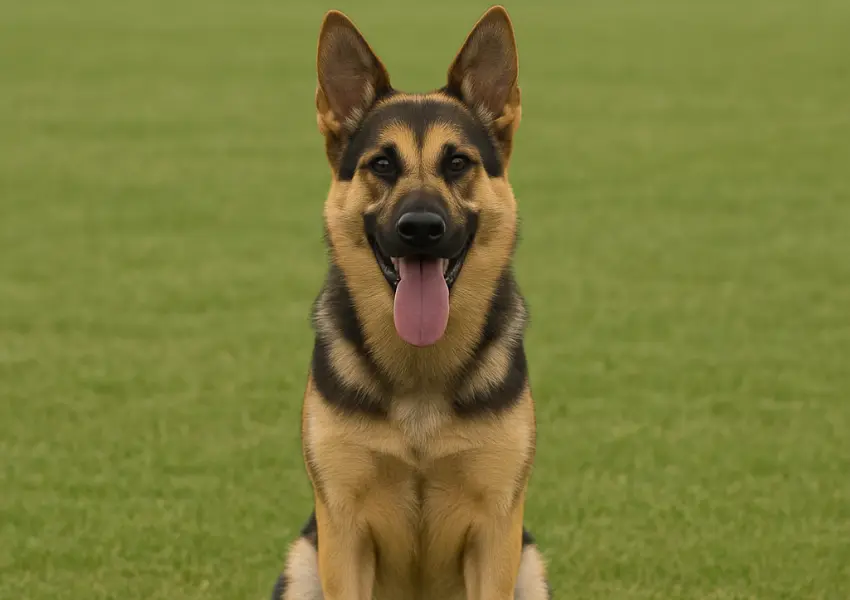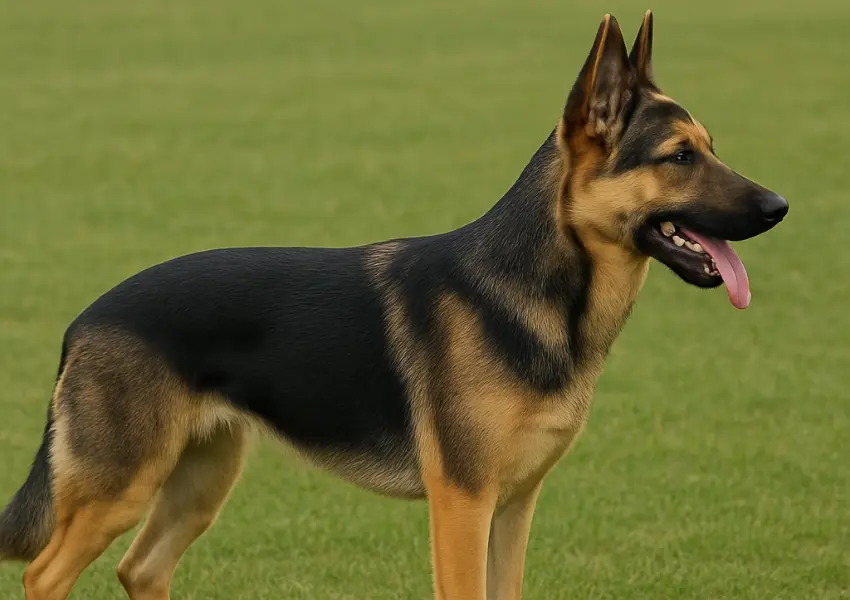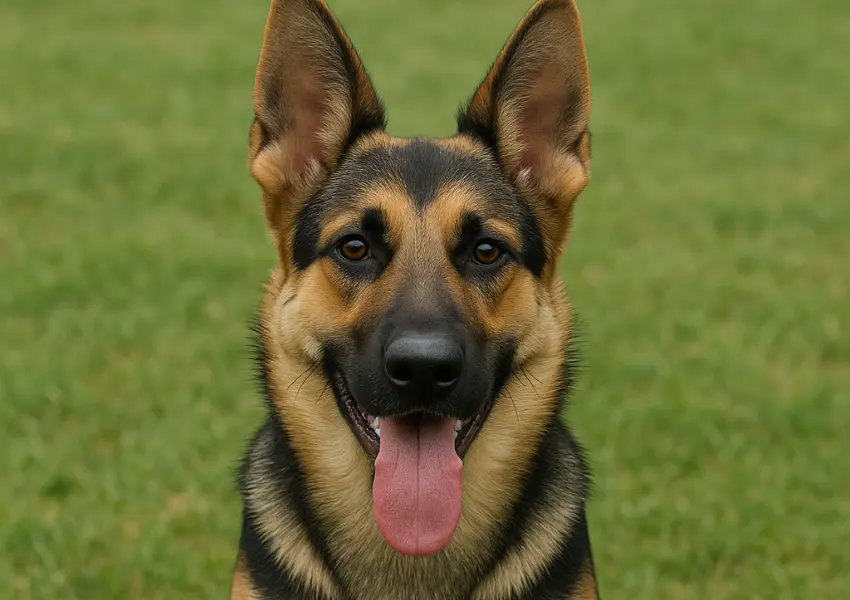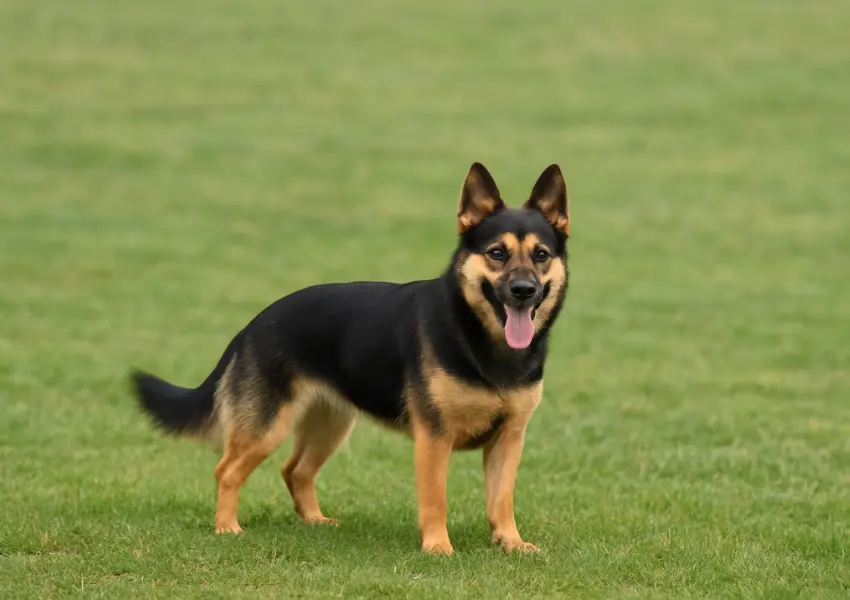A little, smart, and devoted variation of the venerable German Shepherd, a dog renowned for its bravery, devotion, and adaptability, the Mini German Shepherd is Though smaller in stature, this dog is a popular choice for families and people who wish a shepherd-like friend without the big size since it preserves many of the desired features of the full-sized German Shepherd.
But just exactly is a Mini German Shepherd? Is it a myth, a designer breed, or a purebred? From their source to their personality, training needs, health care, and more, this entire guide will dissect what you need to know.

Origin and History
Major kennel organizations like the AKC or UKC do not formally classify the Mini German Shepherd as a breed. Usually, however, it is a hybrid or mixed breed produced by breeding a purebred German Shepherd with a lesser dog breed, such:
- Border Collie
- Poodle
- Corgi
- Terrier breeds
Without compromising the intelligence, loyalty, and working-dog vitality that make them so beloved, this crossbreeding seeks to create a smaller, more controlled variant of the standard German Shepherd.
Rarely, a Mini German Shepherd could also be a purebred German Shepherd with dwarfism, a congenital condition that stunts development. Though ethical breeders usually discourage this condition since it might lead to major health problems.
Breed Traits and Characteristics
Intelligence, energy, faithfulness, and attentiveness are hallmarks of the Mini German Shepherd. They are eager to please, quick learners, and adore having a mission, much like their full-sized counterparts.
Key Traits:
- Size: Smaller than standard German Shepherds
- Lifespan: 11–14 years
- Energy Level: High
- Trainability: Excellent
- Protective Nature: Strong
- Social Needs: Moderate to high
Their appearance and behavior can differ depending on their lineage, particularly in cases of combined with a breed like a Poodle or Border Collie.

Appearance
Though the breed of a Mini German Shepherd is mixed, which will greatly affect their appearance, generally, they look like a smaller variation of the normal German Shepherd.
Common Physical Features:
- Height: 15 to 20 inches
- Weight: 30 to 50 pounds
- Coat: Medium-length, double coat (straight or slightly wavy)
- Colors: From classic black and tan to sable, jet black, or snowy white
- Eyes: Brown or hazel
- Ears: Often upright like a GSD, but may droop depending on the mix
They maintain the classic GSD look — strong build, wolf-like features, and expressive eyes — but in a more compact body.
Temperament and Behavior
Usually smart, obedient, protective, and loving, Mini German Shepherds. They are great watchdogs since their GSD father left strong guarding instincts for them.
Behavioral Highlights:
- Very loyal to their families
- Without proper exposure, they can be reserved or suspicious of strangers.
- When socialized from a young age, they usually interact well with children and other pets.
- Highly intelligent, needs mental stimulation
- They can become anxious or distressed if left alone for extended periods.
These dogs thrive in homes where they can be active participants in daily life, whether it’s playtime, training, or even just going for a walk.
Care Requirements
The Mini German Shepherd needs appropriate care to remain healthy and content, same like any active breed. These dogs need a decent daily physical and mental stimulation; hence, make sure they get at least sixty minutes of exercise every day. This can cover hikes, play sessions, or psychologically interesting pursuits such as obedience training and puzzle toys.
Regarding diet, feed your Mini German Shepherd premium dog food appropriate for their age, weight, and degree of exercise. Their joints and general health may be strained if weight gain results from poorly controlled meals.
Though necessary, grooming is really simple. Two to three times a week, brushing helps to control shedding and maintain healthy and clean fur. To keep proper hygiene, only bathe them when absolutely needed; also, be sure to routinely check and clean their ears, cut their nails, and wash their teeth.
Looking after a Mini German Shepherd also heavily relies on health care. Often, mixed hybrids, kids can inherit medical issues from either parent. Among the most often occurring conditions are hip dysplasia, allergies, intestinal sensitivity, and joint problems, particularly in cases of dwarfism. Plan frequent veterinarian visits and follow a consistent preventative care program to help your dog stay in the best condition.
Are They Good Family Dogs?
Yes, Mini German Shepherds can make excellent family pets, especially for active households.
Pros as Family Dogs:
- Protective yet affectionate
- Great with kids (when socialized early)
- Adaptable to smaller homes or apartments
- Loyal and eager to please
However, families should be prepared for a high-energy dog that needs time, attention, and proper training. They’re not ideal for people who want a low-maintenance or couch-potato pet.
Training and Socialization
Mini German Shepherds are generally a pleasure to train because of their smart and obedient temperament. They are highly intelligent and trainable, which is why GSDs are used in police, military, and service roles.
Training Tips:
- • Start early socialization with people, pets, and environments
- • Use positive reinforcement techniques (treats, praise, toys)
- • Keep training sessions short and fun
- • Be consistent and patient
Due to their smart and sometimes stubborn nature, mental stimulation is just as important as physical exercise.

Cost and Breeders
Mini German Shepherd puppies can vary in price depending on the breeder, location, and lineage.
Average Price:
$800 to $2,500
You might also find them in rescues or shelters at a lower cost, which is a great option if you want to adopt.
Tips for Finding a Responsible Breeder:
- Avoid puppy mills or backyard breeders
- Ask for health clearances and parent history
- Visit the facility or request a video tour
- Make sure the breeder is transparent and reputable
Always prioritize health and ethical breeding over just appearance or size.
Pros and Cons
Here’s a quick overview of the pros and cons of owning a Mini German Shepherd.
Pros:
- Smaller size for easier management
- Intelligent and easy to train
- Loyal and protective
- Adaptable to various lifestyles
- Great with kids and families
Cons:
- High energy — needs lots of exercise
- Not officially recognized as a breed
- Size and traits can be unpredictable
- May have health issues depending on the mix
- Needs early training and socialization
Conclusion
The Mini German Shepherd is a great choice for people who love the traditional German Shepherd but would want a smaller buddy. With appropriate training, love, and attention, this dog will thrive in both busy households and single-owner houses.
Though not a recognized breed, a Mini GSD offers all the intelligence, loyalty, and heart of its larger cousin right in a smaller, more appealing package.
If you are ready to commit yourself to their exercise needs and training expectations, a Mini German Shepherd would be your perfect fluffy buddy.
